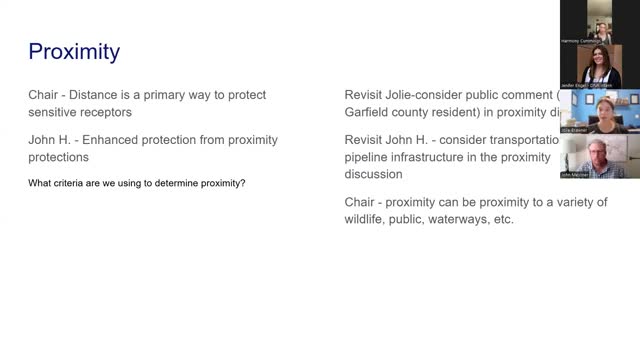Emissions Working Group Discusses VOC Monitoring and Community Health Impacts
July 17, 2025 | Department of Natural Resources, State Agencies, Organizations, Executive, Colorado
Thanks to Scribe from Workplace AI , all articles about Colorado are free for you to enjoy throughout 2025!

This article was created by AI using a video recording of the meeting. It summarizes the key points discussed, but for full details and context, please refer to the video of the full meeting. Link to Full Meeting
Key speaker Harvey highlighted the growing demand from environmental and community groups for greater protection, advocating for avoidance of oil and gas activities in sensitive areas. "Greater protection than distance is avoidance," he stated, underscoring the community's desire to prevent such operations altogether. This sentiment was echoed by other members, who stressed that while distance can serve as a tool for avoidance, it should not be the only measure considered.
Rick contributed to the conversation by discussing the varying emissions profiles of different storage methods, such as open pits versus enclosed tanks. He pointed out that advancements in technology could help mitigate emissions, particularly in densely populated areas. "We need to keep emissions in mind, particularly around the DIC," he noted, referring to the need for tailored regulations in disproportionately impacted communities.
The meeting also touched on the importance of scientific data in shaping regulations. Jesse from the EPA emphasized that proximity to communities should be informed by science-based risk studies rather than subjective measures. He questioned whether the location of facilities was necessary or merely preferred, suggesting that alternative sites should be explored.
As the meeting progressed, participants discussed the need for comprehensive monitoring of volatile organic compounds (VOCs) before and during operations. Thomas pointed out that understanding the timing and concentration of emissions is crucial for assessing public health risks. "Monitoring is super important because only by having it in place can we determine whether these operations impact public health," he stated.
The conversation concluded with a call for enhanced emissions capture technologies, particularly in communities that are disproportionately affected by oil and gas operations. John noted that while current regulations encourage minimizing emissions, there is a need for clearer differentiation in standards based on community impact.
As the consortium moves forward, the discussions from this meeting will likely shape future regulations and operational practices, aiming to balance industry needs with community health and environmental protection.
Converted from 2025 July 11 Colorado Produced Water Consortium Meeting meeting on July 17, 2025
Link to Full Meeting
Comments
View full meeting
This article is based on a recent meeting—watch the full video and explore the complete transcript for deeper insights into the discussion.
View full meeting